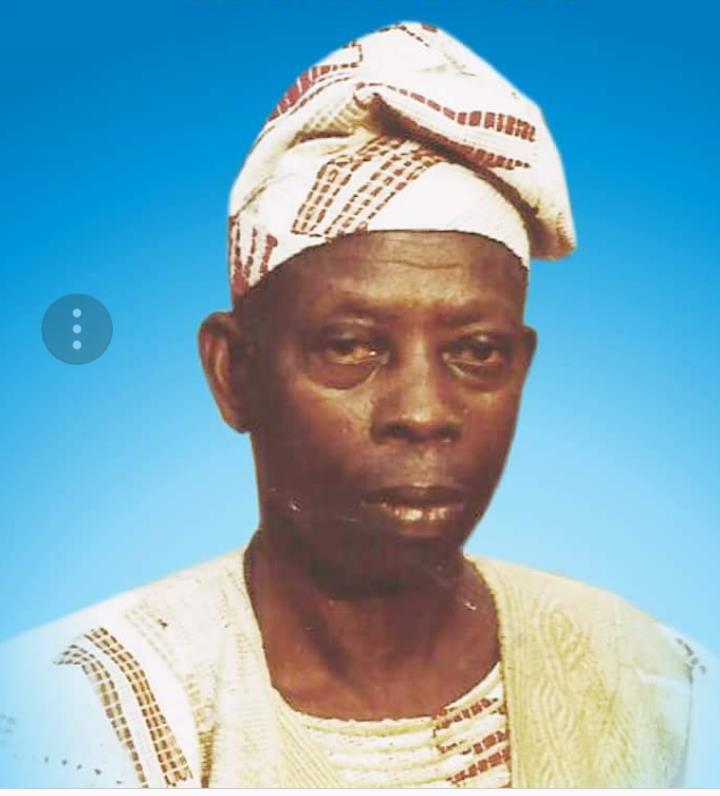...To get all news updates, Join our WhatsApp Group (Click Here)
Also Join our WhatsApp Channel (Click Here)
BY: FEMI ODUFOWOKAN
Exactly five years today, 29th May 2013, my father, Chief John Abolaji Odufayo Odufowokan of Odunuga dynasty of Ijebu Land answered the call of Almighty. He died at an advanced age, about ninety years old.
He was a highly intelligent man despite the fact that he had little education (standard two) but equipped with the good dose of Yoruba traditional philosophy. He was a man that usually held strongly to his positions on issues unless you could convince him with superior positions or arguments. Sometimes, I had intentionally stuck to my position while I engaged him and not expecting him to easily detect my intent of wanting to engage him. He had told me on those occasions, “ti o ba gba temi, mo gba ti e” that is, “if you do not agree with my position, I agree with yours.” He would purposely say this statement to end the argument.
I remember him every day since his demise. One principle that he held and passed to those of us that lived with him and close to him is “Seven O’clock to Seven O’clock” (7 a.m. to 7 p.m.) principle. My father would not go out of his house before seven a.m., and as a matter of his principle, he must be back in his home by seven p.m. As a young boy living with him in Ibadan, he had explained the rationale behind his “7 to7” principle to me. He said that the society was full of wicked people and wicked people mostly operate under the covers of night. Wicked people are not necessarily diabolic or occult practitioners alone, but those who can physically harm another person. By seven a.m. and till seven p.m., you can see people coming behind you and people going in your front or sideways. If need be for you to run to safety you will run and if by a chance you are harmed people will see the person that is responsible. On further probing him as to who would want to harm me, a young boy of the elementary school.
He had answered, “Ti owo ko ba ka igi araba, owo a ka egbo idi igi araba.” which has a meaning that if araba tree is too big and strong to be cut down, the roots of araba tree would be easier to cut. He also told me that “oru ko mo eni owo” i.e. darkness does not know a man of honour. Since that time, “7 to7” principle has always been part of me. On some occasions when I have to stay outside beyond “7 to 7”, particularly for political activities or any other compelling reason, I am always conscious and careful. I carried this to the extreme sometimes, for an example, when my children some time ago wanted to go to the mall around 8:00 p.m., in that part of the world, the weather was just like 6 p.m. of Nigeria time. When I told them it was late and that my father had told me and that we should always obey “7 to 7” principle and the reason behind the principle.
They started laughing and replied that even though it was 8:00 p.m., but it was not dark and besides the place is 24 hours country with sufficient security architecture. Not knowing what to tell them, I restored in telling them that one must not disobey his or her father, my father had said “7 to7”, and I am also telling you same.
Another interesting Yoruba philosophy that I learned from my father was when he had told a man at Ibadan where my father was the head of motor spare parts sellers of people that are of Ijebu origin. The position entrusted to him required that he was settling disputes that concerned Ijebu spare parts sellers. This man came to my father for some advice. At that time when my siblings and I were back from school, we were staying with my father at his shop. The man told my father that he doubted the paternity of his last child from his wife. My father asked him if he had any full proof or evidence (eri ti o da ju) that the child was not his, (there was no DNA or probably not popular then), but he gave a negative response. At this time, my father responded that “eni to ni igi obi lo ni eso ori e” i.e., the owner of the kola-nut tree is the owner of the fruits or seeds on the tree. As the husband of the woman, that the man is the owner of the child. I didn’t understand the basis of such declaration by my father until I was in part three of law programme, where the late Prof. Jelili Adebisi Omotola (Omo T) was teaching us land law. He told us one Latin word and the meaning i.e. “qui qui patator, solo solo cedi” which means whatever that is attached to the land belongs to the land. If someone erects a permanent fixture on another person’s lawful land, such a structure belongs to the owner of the land. Explicitly, whatever that is found attached to the land or underneath the land (other than mineral resources) belongs to the owner of the land. I understood the professor’s lecture better with “eni to ni igi obi lo ni eso ori e” that I had heard from my father when I was young.
Among other interesting Yoruba wise sayings, I learned from my father is “omo eye to nko fifo to fe ba adan fiiye gba ara, ile lo ma ba ara e”, meaning a young bird that is learning the art of flying game with a bat will fall on the ground. Naturally, a bat is that species of bird that has both the features of a bird and a rat. It is so skillful in flying to the extent that it can turn its head upside down. I heard this from my father when a younger woman was trying to engage in a fight with another older woman. The younger woman was so abusive and had no regard or respect for the older woman and the generality. Not quite long, the younger woman lost one of her grandsons living with her. She was so pained while crying and wailing, she said she was punished and cheated. As a young boy when I asked my father who punished and cheated the woman and for what reasons? My father said a young or baby bird that is just learning the art of flying is engaging in flying games with the bat that is why the younger woman fell on the ground. After much pressure from me, he told me that if truly the younger woman was punished and cheated from the quarter she suspected, she must have passed her boundary and did not known the limit of her strength compared to the older woman.
Another related Yoruba saying/proverb to the above, but seems to be contradictory to the above wise saying is an acknowledgment of powerlessness,at times of supernatural human being. As a young qualified lawyer, I went to the village where I met my dad. He had gone to the village before me. On getting there, I met him with a woman from another village selling pap (my father favourite meal in the morning), after greetings, I wanted to sit down, but my father wanted me to go greet people at the village about fifteen houses before I settled down. The woman objected on the ground that people are wicked that my father should not allow me to do such as he introduced me to the woman as his newly qualified lawyer and son. My father said for two reasons I should go round. Firstly our village is unique in the sense that it is a neclus family settlement. We are all from the same grandfather or great-grandfather – Odunuga. There is nobody in the village that is not our family or relation. Secondly, and perhaps the gist of the matter, my father said, “Oju oso ati aje ni won se bi oba ilu.” Meaning, witches, and wizards were alive and aware when the king of a town was born. I comprehended the saying literarily to mean that, if super natural human beings are interested in harming you as an adult, they could have done that before you were born or when you are an infant. Anytime I reflect on his Yoruba philosophies, I usually agreed with his saying that “ogbon, imo ati oye ko dogba” i.e. wisdom, understanding and knowledge are not the same. Having knowledge of something or situation may not necessarily mean you have an understanding (which is deeper) and of course, wisdom transcends both knowledge and understanding. May the Almighty Lord grant and continue to endow us with the trinity of wisdom, knowledge and understanding. There is no better way for me to remember him than the usefulness of the lessons of his Yoruba traditional philosophy.
“Erimoje olodo bi ere, o ba obinrin sun tomu tomu, aduro ki oba lodo Esa, Odimoro omo olowo ape, Olalomi Olofamojo”. Sleep on, sleep well, my father and my friend. I am benefitting from many of your Yoruba Philosophies.
CHIEF FEMI ODUFOWKAN
****Chief Femi Odufowokan is the immediate past council Chairman of Ijebu North East Local Government in Ogun State and a Lagos based Legal Practitioner
You can get every of our news as soon as they drop on WhatsApp ...To get all news updates, Join our WhatsApp Group (Click Here)
Also Join our WhatsApp Channel (Click Here)

















